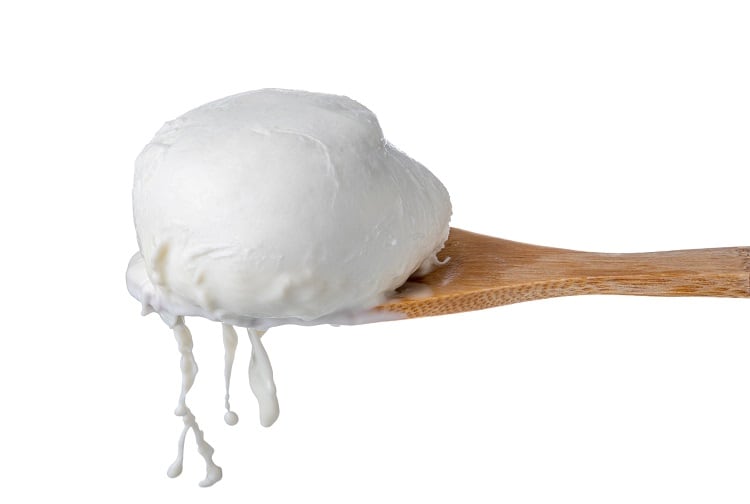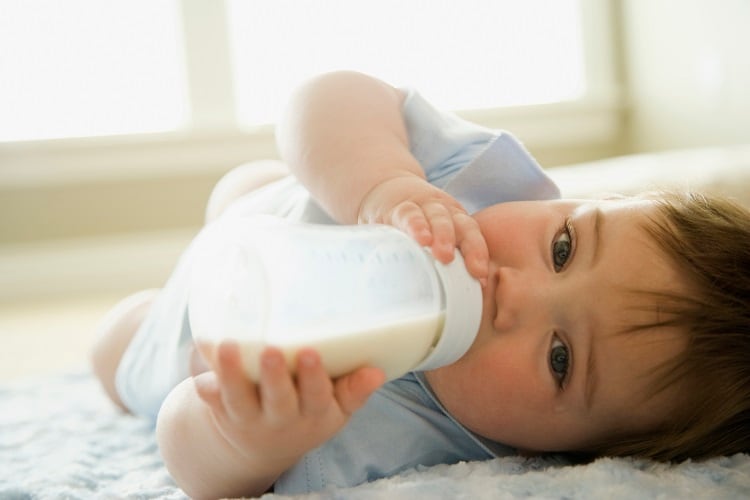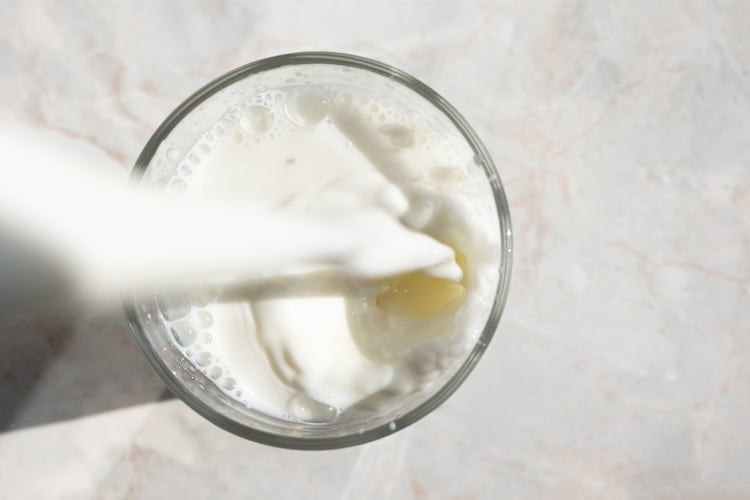Globally, the dairy industry emits around 3.4% of total CO2e emissions. According to the FAO, the biggest component of those emissions is methane.
This is not good news for climate change, with emissions from large-scale dairy operations on the rise. According to a 2020 study, between 2015 and 2017 total combined emissions of 13 of the world’s largest dairy corporations rose by 11%.
“Cows are causing a lot of problems, from climate change to deforestation, water use and of course animal suffering,” noted food tech entrepreneur Zoltan Toth-Czifra at the Mylkcubator demo day last week.
“But a new paradigm shift is on the way. It turns out you don’t need cows at all to make milk,” he told delegates.
“This century is going to be about cellular agriculture…food is going to get healthier, tastier, and cheaper. Cellular agriculture dairy will beat traditional alternatives everywhere.”
Toth-Czifra founded Barcelona-based Real Deal Milk based on these beliefs. The food tech start-up is leveraging cellular agriculture – in the form of precision fermentation – to develop vegan cheese from microbes, rather than cows.
100% vegan cheese
Real Deal Milk was founded in 2021. In Toth-Czifra’s words, the start-up ‘teaches yeast cells how to be cows’. By programming microorganisms and leveraging fermentation technology, Real Deal Milk is able to recreate milk proteins that are 100% vegan.
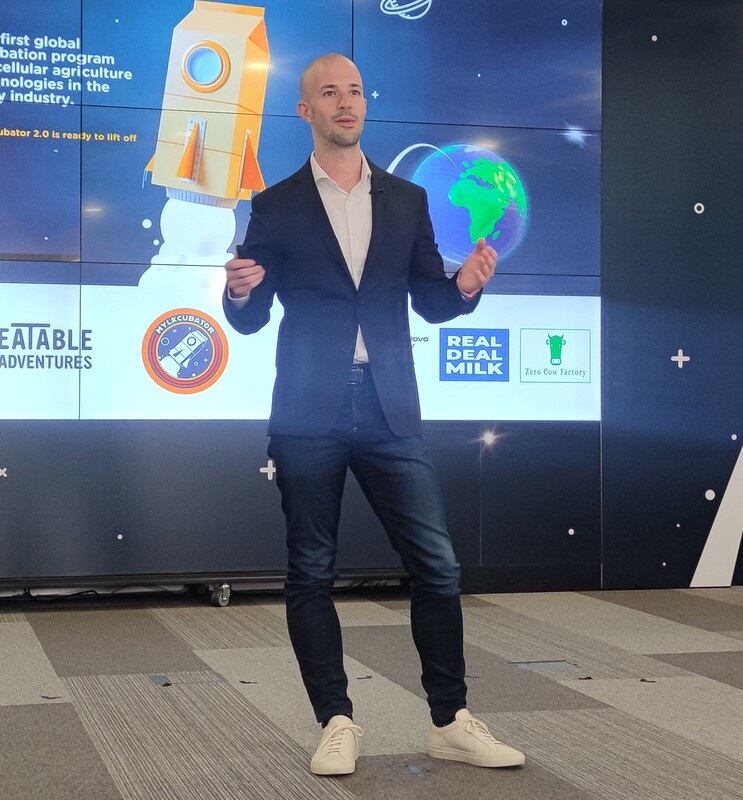
The start-up’s cheese products, made using these precision fermentation techniques, will ‘definitely’ be classified as vegan, explained Gabriel Mora, Chief Researcher at Real Deal Milk.
“Even the cow DNA that goes into our microorganisms don’t physically come from a cow,” he explained at the event. “It comes from a database…we modify it as required and put it into our microorganisms.
“Then we feed them with minerals, water, and plant-based derived substrates for their growth. So there is no animal going into the production process.”
Of course, plant-based cheese is also 100% vegan, but Real Deal Milk is not convinced current offerings are up to scratch. “The market hasn’t yet found a good plant-based alternative,” founder Toth-Czifra told delegates.
The cheese category is also attractive due to its market growth. “Dairy has a huge market and is growing. And no matter how you slice it, it’s really big.”
Indeed, according to Statista, the global cheese market was valued at over $77.6bn in 2021, and is forecast to reach over $113bn by 2027.
“It turns out nobody wants to live in a world without mozzarella or Greek yoghurt,” he enthused. “What excites me about this project is that it promises to move away from animal agriculture, but allows us to keep all the foods that we love.”
Which cheeses is Real Deal Milk serving?
The start-up has already achieved ‘exponential’ secretion of all six major milk proteins: the four caseins (αS1, αS2, β, and κ) and the two major whey proteins (α-lactalbumin and β-lactoglobulin).
The focus is now on improving yield and efficiencies, and over the next 18 months will work on scaling the process and moving from the production of individual proteins to the formation of a multi-protein micelle.
Real Deal Milk is also developing its purification strategy, specifically suited to its dairy production set-up, revealed chief researcher Mora.
Which cheeses is Real Deal Milk focusing on? “Initially, the easiest to tackle cheese are the fresh, non-aged cheeses like mozzarella or Oaxaca,” said CEO Toth-Czifra. ”Mozzarella is the most popular cheese in the world as well.
“Over time our goal is to make a wide variety of cheeses and other dairy products.”
Real Deal Milk is not the only precision fermentation start-up working in the cheese space. Germany-based Formo is also initially targeting the soft space cheese with mozzarella and ricotta alternatives. In the UK, Better Dairy is another interested in the cheese space – but predominantly aged, hard cheeses such as cheddar.
But Toth-Czifra suggested investors have a big enough appetite to serve the nascent sector.
“We’re not the only ones working on this technology, there are currently about a dozen well-funded companies globally who are working on similar technologies.
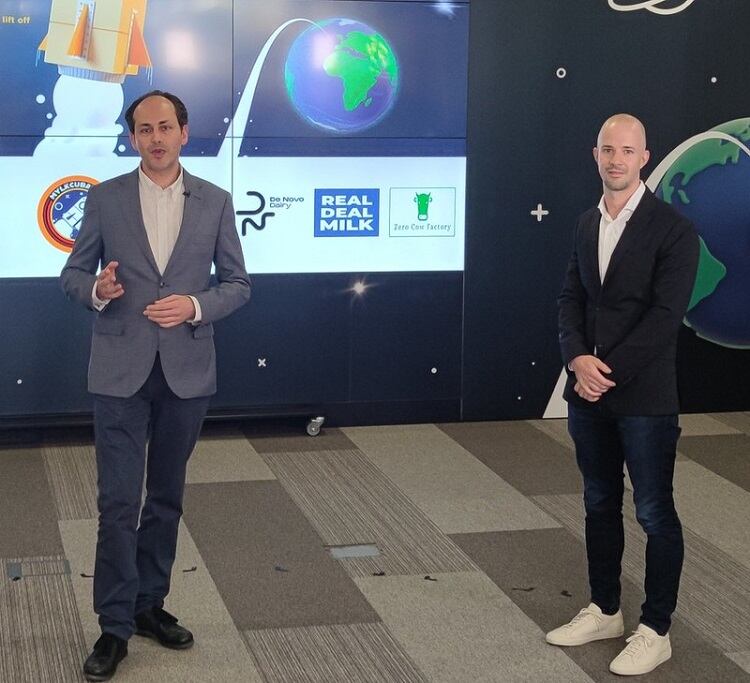
“Last year there was more money going into the fermentation alternative space than in any other years before combined,” we were told.
“Over $1.6bn. We think that’s a lot of cheddar. This space is growing very dynamically.”
Eyes on Europe for commercialisation
Real Deal Milk is building a B2C brand, so that it can play a bigger role in educating consumers.
“We think it’s very important that we educate our future customers about this new technology and new product category,” explained the CEO.
And those consumers will be omnivores. While first customers are likely to be ‘conscious eaters, such as vegans’, the start-up is convinced that to have an impact, it will need to ‘speak to everyone’: “We need to create better, cheaper, tastier and healthier products for everyone.”
Concerning target geographies, Real Deal Milk is focusing on Europe – the region with the ‘biggest dairy market’ and the ‘richest culture associated’ with the sector.
While not able to put an exact date on its first product launch, the CEO suggested we should expect to products on supermarket shelves in a 'couple of years’.


